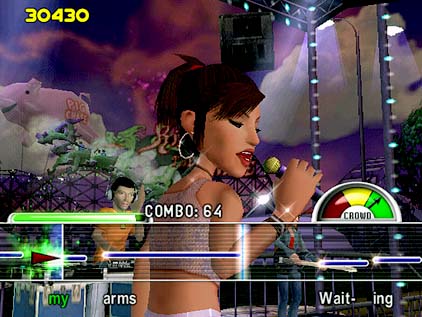

|
Got Game? Wilma Jandoc |
COURTESY OF KONAMI Karaoke Revolution
hits an off-key note
Leave it to Konami to take yet another generally fun activity and boil it down into a matter of how well you can match up marks on a TV screen.
Karaoke Revolution
Platform: Playstation 2
Manufacturer: Konami
Genre: Music
ESRB rating: E (Everyone)
"Karaoke Revolution" is Konami's latest entry in its Bemani music game series. Only thing is it's not as much fun as "real" karaoke.
The object of the game is to sing a song as closely as possible to the original artist. Granted, that is the point to karaoke in general. But having such a requirement in a game doesn't offer much leeway for you to put your personal stamp on things, unlike most other Bemani games such as Dance Dance Revolution, Drum Mania or Guitar Freaks.
The game comes bundled with a microphone headset that you use to sing. (Single copies of the game are due next year.)
In the single-player Showtime mode, you choose one song from a preset list of four to sing in a particular venue. The venues start from the most forgiving arena of a house party, all the way to the star-studded Enormobowl. The better you sing -- or, rather, the better your voice matches the bars onscreen -- the more your "crowd meter" rises. Keep the meter out of the red "fail" area to advance. Keep your voice on pitch to make combos for extra points and to really heat up the crowd.
In pure showbiz style, you can choose your own character and name for your performances. And the secrets you unlock by passing venues include new outfits for the characters.
Four levels of scoring from easy to expert give even the worst singer a chance. And for all the guys who feel like tackling "Girls Just Wanna Have Fun" or ladies who'd like to try "Save Tonight," the game allows you to sing in different octaves.
The lyrics run across the bottom of the screen in the Music Staff area during the song. Each syllable is assigned a bar, which represents the pitch and length of each note you have to sing.
So even if you don't know a particular song, you could wing it just by trying to match the bars. (This reviewer did, and managed a decent score on Easy.) There is a "sound check" available after you choose a song so you can practice before an actual "performance."
For a more party feeling, the game has multiplayer modes that pits several singers against each other. In Arcade mode, singers take turns to see who can score the most points. In Competition, judging is given over to the players instead of the game system; the contestants rate each singer through secret ballot after that person's performance.
Karaoke Revolution's scoring system is the ultimate equalizer and ego-crusher in that "bad" singers could score better than "good" ones. No matter how good you may sound to human ears, if the game doesn't think you match up to its level, you won't pass muster.
Included in the game is a regular karaoke mode in which you can sing any of the game's songs free from scoring. The instruction manual mentions separate "expansion discs," which presumably will contain additional songs.
But even with the karaoke mode and the promise of new songs, Karaoke Revolution just isn't worth it either as a game or a cheaper method of singing practice.
One of the selling points of karaoke is that the singer's voice doesn't have to be a carbon copy of the original artist to be good, and this game's main flaw is that it doesn't allow for much deviation from its standard.
If you want a good party activity, it's better just to rent a real karaoke player. At least that way, you have a higher chance of finding a song you can really perform, and you won't have that brutal measure of just how off-key you've been singing your favorite songs.
See the Columnists section for some past articles.
Wilma Jandoc covers the universe
of video games, anime, and manga for
the Star-Bulletin. She can be e-mailed at
wjandoc@starbulletin.com

